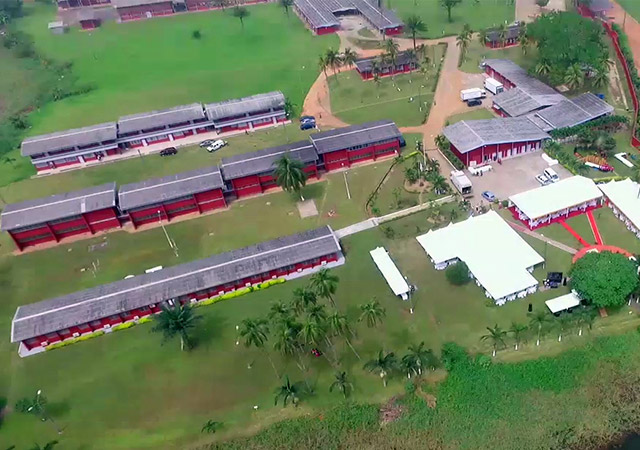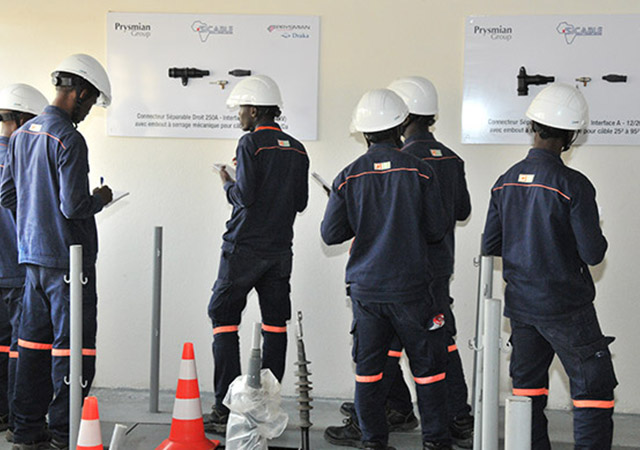Located in Bingerville, on a 25-hectare site with 77 rooms, the Centre for Electricity Jobs (CME) aims to provide lifelong learning and improve employability. Its vision is part of a necessary approach that will help to support change in Africa. The CME is a professional training centre that is no longer simply for Eranove group employees. It has become a higher education institution for technology, and is now open to professionals, students and companies. It was recognised by the Ivory Coast’s Ministry of Higher Education and Scientific Research in December 2018. The CME was certified as a centre of excellence by the Association of African Electricity Companies (ASEA). It is the only centre in Western Africa to have obtained SERECT certification for live low voltage and type A low voltage work. Open to the African industrial sector, it has students from 11 different nationalities. It offers BTS and DUT degree courses and professional degrees, as well as lifelong learning and certified training:
- It welcomes between 5000 and 7000 trainees into its professional degree programme each year. Of these, 4000 are employees who are taking advantage of tailor-made lifelong learning classes, or who are enrolled in some of the 300 theoretical or practical modules available in the catalogue.
- It allows 220 professionals to begin formal education, 20.7 % of which were young women in the first year. Since 2015, the CME has offered a Technical Training Degree (BTS) in Electrical Engineering, which had a 95% success rate in 2017, and a 98% rate in 2018, compared to the national average, which is 57%. The 100% graduate employment promise is about to be fulfilled, as 71% of the 2017 graduates had found a job within six months.
The CME is preparing to meet the labour market’s demand for skills as well as the needs of the BTS and DUT degree students who want to further their studies. In order to do so, six professional degrees were launched in 2018, covering everything from robotics to regulation, and industrial computing.
The student body grew to 443 students at the start of January 2019, of which 120 were on the professional degree course.
A step forward was taken in 2018, when it first became possible for a French degree to be awarded in the Ivory Coast, in partnership with the National Conservatory of Arts and Crafts (CNAM) in Paris. This professional degree is in “Sustainable development, with energy efficiency, energy from renewable sources and home automation”. All the professors are Ivorians, who are certified and recognised by CNAM. CNAM will help to run the programme, ensuring that its pedagogical requirements are met. The degree is recognised in France, and is the only professional degree that will be a sandwich course, with one month of classes and one month of work placement. This is made possible by the Eranove group’s network of clients, who also act as training partners. Our ecosystem allows us to have an excellent knowledge of what is required, and enables us to offer training courses and methods that are essential for employability.
It was this approach that enabled our e-learning modules to be developed, within the context of an “E-learning Technology Factory”. This is a factory of accessible content that is specifically written to accommodate distance learning, and which is monitored and evaluated. In the context of the “Energy Manager” professional degree course, taken by 16 CIE professionals in 2018, 80% of the time is dedicated to e-learning, and 20% is on-site, putting the knowledge into practice. These courses are paid for, but have accessible prices, compared to market rates.
Finally, the CME has a TechLab. This is a space for creating projects, inspired by the FabLab at the famous Massachussets Institute for Technology (MIT). It enables people to gain manufacturing experience using common tools, such as 3D printers, sewing machines, drills, etc. “This space is focussed on robotics, electricity and digital technology, as well as the promising sectors of renewable energy and home automation. The TechLab is open to those professionals in the sector who need it, even if they aren’t studying at the CME. A self-employed entrepreneur can spend two or three months with us to develop a prototype, for example” explained Paul Ginies, director of the CME.








